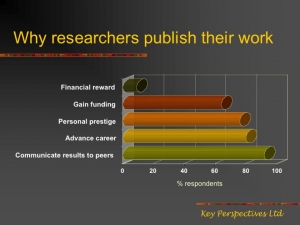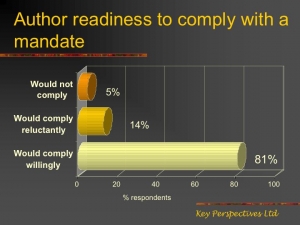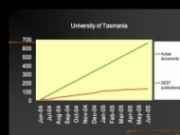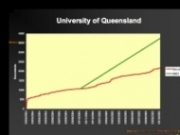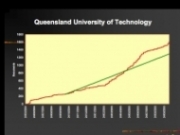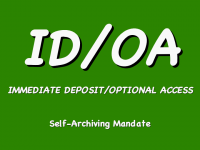Sunday, September 3. 2006
The Geeks and the Irrational
Trackbacks
Trackback specific URI for this entry
No Trackbacks
Comments
Display comments as
(Linear | Threaded)
Stevan guesses right, of course, and it's hardly a guess. There is a lot of benefit for science and society as a whole, but in general there simply isn't enough in open access for individual researchers to voluntarily make the extra effort ("Can't be bovvered."). So the discussion is not 'do scientists provide open access or not', but it is 'do funders mandate open access or not'. This mandating they can do in one of two ways: they can mandate so-called self-archiving the published version of the articles based on the research they fund, or they can mandate open access publishing of those articles. Stevan c.s. argue that researchers do not self-archive the 'published' version, but their own manuscript version, and that the two are not the same. This is nonsense, of course. Apart from cosmetics, a self-archived manuscript version is (at least can be) the same as the formally published one, especially if it is accompanied by a 'label' indicating that the article has been peer-reviewed, accepted, and published by journal X. And you can be sure the depositor will always self-archive it accompanied by those 'metadata', lest the article is not taken seriously at all. Self-archiving is thus the perfect way of having one's cake and eating it. The premise in this model is that librarians keep on paying for the cost of sustaining the journals. And, of course, librarians still do. At least in physics. Illogical and irrational as it may be. The model therefore seems to be based on illogical and irrational behaviour by librarians. Long may it last.
The other way of achieving open access is for funders to mandate and support open access publishing. No need to rely on illogical or irrational behaviour of anybody, but simply a scaleable economic model in which what journals and their publishers undertake in order to make a potentially interesting article into an open access peer-reviewed, formally published and 'certified' one, financially supported via article processing charges. Not only is such a model not dependent on illogical and irrational behaviour, but it is aligned with the 'force fields' in the scholarly research domain, best described by 'publish or perish' (and not by 'read or rot'). As a result, this would be a system with much less tension. Some prestigious funders have already acted upon that insight and formulated policies that support open access publishing, providing a solution at the very roots of the access problem. May many follow soon.
"(IF AND WHEN the urgent question should ever become (1) how to pay publication costs (subscriptions having been cancelled) rather than (2) how to end access-denial and impact-loss (as now), THEN the windfall savings from the subscription cancellations will be the rational source out of which to pay the publication costs. To pay for OA now, in advance, when all the money is all still tied up in subscriptions, when all costs are still being covered, and when catastrophic cancellations are only a hypothetical possibility -- well, you find your own preferred i-word for describing it...)"
Stevan is very clear here: leave the writing of the cheques to support of the journals system entirely in the hands of the librarians in their traditional role and with their inadequate library budgets. Never mind the growth of research output; never mind the fact that this growth is unconnected to library budgets; never mind the extra cost of repositories; never mind the extra bother of self-archiving for the researchers; never mind the complete disconnect between what's paid for (access) and the deliverable (the service of publishing). Until that support system collapses completely, and then we'll reinvent publishing. It's a method.
Jan Velterop
The other way of achieving open access is for funders to mandate and support open access publishing. No need to rely on illogical or irrational behaviour of anybody, but simply a scaleable economic model in which what journals and their publishers undertake in order to make a potentially interesting article into an open access peer-reviewed, formally published and 'certified' one, financially supported via article processing charges. Not only is such a model not dependent on illogical and irrational behaviour, but it is aligned with the 'force fields' in the scholarly research domain, best described by 'publish or perish' (and not by 'read or rot'). As a result, this would be a system with much less tension. Some prestigious funders have already acted upon that insight and formulated policies that support open access publishing, providing a solution at the very roots of the access problem. May many follow soon.
"(IF AND WHEN the urgent question should ever become (1) how to pay publication costs (subscriptions having been cancelled) rather than (2) how to end access-denial and impact-loss (as now), THEN the windfall savings from the subscription cancellations will be the rational source out of which to pay the publication costs. To pay for OA now, in advance, when all the money is all still tied up in subscriptions, when all costs are still being covered, and when catastrophic cancellations are only a hypothetical possibility -- well, you find your own preferred i-word for describing it...)"
Stevan is very clear here: leave the writing of the cheques to support of the journals system entirely in the hands of the librarians in their traditional role and with their inadequate library budgets. Never mind the growth of research output; never mind the fact that this growth is unconnected to library budgets; never mind the extra cost of repositories; never mind the extra bother of self-archiving for the researchers; never mind the complete disconnect between what's paid for (access) and the deliverable (the service of publishing). Until that support system collapses completely, and then we'll reinvent publishing. It's a method.
Jan Velterop
See: "Open Choice is a Trojan Horse for Open Access Mandates" (Jun 2006)
http://www.ecs.soton.ac.uk/~harnad/Hypermail/Amsci/subject.html#5444
On Tue, 5 Sep 2006, Jan Velterop [ JV ], Springer UK wrote:
JV: "The discussion is not 'do scientists provide open access or not', but it is 'do funders mandate open access or not'."
Agreed! (but its funders and universities...) http://www.eprints.org/openaccess/policysignup/
JV: "Self-archiving is thus the perfect way of having one's cake and eating it. The premise in this model is that librarians keep on paying for the cost of sustaining the journals. And, of course, librarians still do. At least in physics. Illogical and irrational as it may be. The model therefore seems to be based on illogical and irrational behaviour by librarians. Long may it last."
Researchers have their (research) cake, but they have been needlessly losing at least half its potential use, and OA self-archiving is intended to remedy that.
http://opcit.eprints.org/oacitation-biblio.html
As long as there is demand for (1) the paper edition and (2) whatever value is added to the publisher's official version (over and above what is in the author's refereed final draft), librarians will use their serials budgets to subscribe to pay for as many of those journals as they need and can afford.
If and when the demand disappears and the journals are cancelled, the (part of) the institution's windfall savings from the budget for incoming serials can and will be redirected toward paying publication costs of the institution's outgoing articles.
Nothing irrational in that. What would be irrational would be to pay for publication now, when the subscriptions are still being paid, and when it is still unknown whether and when demand will disappear -- whereas it is known that potential research impact is needlessly disappearing daily.
JV: "The other way of achieving open access is for funders to mandate and support open access publishing."
Why should funders pay a penny more now, when (1) all publication costs are still being paid out of institutional subscriptions, (2) no one knows whether and when they will cease being paid, and (3) what is missing is not extra funds for publication costs, but lost research impact?
Why should universities and funders mandate anything but the stemming, at last, of that needless research impact loss, by requiring that the research be self-archived?
And this is without even bringing up the vexed question of how much OA publication should cost if and when it ever becomes necessary to pay for it. Not only is paying now a needless extra expense, but the amount paid is arbitrary.
Offering Open Choice is fine. Paying for it voluntarily is fine too. But trying to get funders to mandate OA publishing, and pay for it -- rather than to mandate OA, and wait and see whether, when, and how much needs to be paid -- well, it's an understandable strategy on the part of publishers attempting to minimize all possible risk to the bottom line. But I hope it will be understand that for the research community, maximizing research impact is a far greater priority that minimizing all possible risk to publishers' bottom lines.
Yes, the research community is unspeakably sluggish about pursuing its own Rational Self-Interest, which is why OA mandates -- like "publish or perish" itself -- have proven necessary. But these OA mandates are meant to serve the research community's interests, to minimize the research community's liabilities not to minimize the publishing community's risks -- particularly at a time when the publishing community is still handily making daily ends meet, whereas research impact is being needlessly hemorrhaged daily, with cumulative, unredeemable losses.
The actual present needs of research surely trump the hypothetical future needs of publishing.
JV: "Stevan is very clear here: leave the writing of the cheques to support of the journals system entirely in the hands of the librarians in their traditional role and with their inadequate library budgets."
Please recall that all those institutional library budgets are inadequate for each institution's access needs, but they are adequate for covering publishers' revenue needs!
JV: "Never mind the growth of research output; never mind the fact that this growth is unconnected to library budgets;"
OA self-archiving is intended in order to remedy research access needs, and the resultant research impact losses. OA is about research accessibility, not about journal affordability. Libraries buy what they can afford, as long as there is demand. Researchers need maximized access and impact right now.
JV: "never mind the extra cost of repositories;"
What extra cost? And why are publishers worrying about that? It's not their problem!
"Institutional Cost of Creating/Maintaining an OA Repository"
http://www.ecs.soton.ac.uk/~harnad/Hypermail/Amsci/subject.html#5210
http://wiki.eprints.org/w/How_much_will_it_cost%3F
JV: "never mind the extra bother of self-archiving for the researchers;"
Researchers will not know how little bother it is until/unless they do it. That's what the mandates are for:
Carr, L. and Harnad, S. (2005) Keystroke Economy: A Study of the Time and Effort Involved in Self-Archiving. http://eprints.ecs.soton.ac.uk/10688/
JV: "never mind the complete disconnect between what's paid for (access) and the deliverable (the service of publishing). Until that support system collapses completely, and then we'll reinvent publishing."
I couldn't quite follow that, but it sounds like the understandable risk-averseness of an industry. Fair enough.
But the "support system collapse" you speak of is not actual but hypothetical, contingent on demand, and its remedy (redirection of what is currently being spent on subscriptions) is obvious. Whereas the loss of research access and impact is actual, and cumulating daily, needlessly, because the remedy is also completely within reach: Self-archiving mandates by researchers' institutions and funders.
Let us remedy the actual acute problem, and deal with the hypothetical problem if and when it actually manifests itself. (The means are there.)
(Jan, your arguments are awfully familiar, and they sound very much like those of the non-OA publisher lobby that has been opposing the OA self-archiving mandates...)
"Open Letter to Research Councils UK: Rebuttal of ALPSP Critique" Berners-Lee et al. (8 signatories)
http://openaccess.eprints.org/index.php?/archives/18-guid.html
Stevan Harnad
http://www.ecs.soton.ac.uk/~harnad/Hypermail/Amsci/subject.html#5444
On Tue, 5 Sep 2006, Jan Velterop [ JV ], Springer UK wrote:
JV: "The discussion is not 'do scientists provide open access or not', but it is 'do funders mandate open access or not'."
Agreed! (but its funders and universities...) http://www.eprints.org/openaccess/policysignup/
JV: "Self-archiving is thus the perfect way of having one's cake and eating it. The premise in this model is that librarians keep on paying for the cost of sustaining the journals. And, of course, librarians still do. At least in physics. Illogical and irrational as it may be. The model therefore seems to be based on illogical and irrational behaviour by librarians. Long may it last."
Researchers have their (research) cake, but they have been needlessly losing at least half its potential use, and OA self-archiving is intended to remedy that.
http://opcit.eprints.org/oacitation-biblio.html
As long as there is demand for (1) the paper edition and (2) whatever value is added to the publisher's official version (over and above what is in the author's refereed final draft), librarians will use their serials budgets to subscribe to pay for as many of those journals as they need and can afford.
If and when the demand disappears and the journals are cancelled, the (part of) the institution's windfall savings from the budget for incoming serials can and will be redirected toward paying publication costs of the institution's outgoing articles.
Nothing irrational in that. What would be irrational would be to pay for publication now, when the subscriptions are still being paid, and when it is still unknown whether and when demand will disappear -- whereas it is known that potential research impact is needlessly disappearing daily.
JV: "The other way of achieving open access is for funders to mandate and support open access publishing."
Why should funders pay a penny more now, when (1) all publication costs are still being paid out of institutional subscriptions, (2) no one knows whether and when they will cease being paid, and (3) what is missing is not extra funds for publication costs, but lost research impact?
Why should universities and funders mandate anything but the stemming, at last, of that needless research impact loss, by requiring that the research be self-archived?
And this is without even bringing up the vexed question of how much OA publication should cost if and when it ever becomes necessary to pay for it. Not only is paying now a needless extra expense, but the amount paid is arbitrary.
Offering Open Choice is fine. Paying for it voluntarily is fine too. But trying to get funders to mandate OA publishing, and pay for it -- rather than to mandate OA, and wait and see whether, when, and how much needs to be paid -- well, it's an understandable strategy on the part of publishers attempting to minimize all possible risk to the bottom line. But I hope it will be understand that for the research community, maximizing research impact is a far greater priority that minimizing all possible risk to publishers' bottom lines.
Yes, the research community is unspeakably sluggish about pursuing its own Rational Self-Interest, which is why OA mandates -- like "publish or perish" itself -- have proven necessary. But these OA mandates are meant to serve the research community's interests, to minimize the research community's liabilities not to minimize the publishing community's risks -- particularly at a time when the publishing community is still handily making daily ends meet, whereas research impact is being needlessly hemorrhaged daily, with cumulative, unredeemable losses.
The actual present needs of research surely trump the hypothetical future needs of publishing.
JV: "Stevan is very clear here: leave the writing of the cheques to support of the journals system entirely in the hands of the librarians in their traditional role and with their inadequate library budgets."
Please recall that all those institutional library budgets are inadequate for each institution's access needs, but they are adequate for covering publishers' revenue needs!
JV: "Never mind the growth of research output; never mind the fact that this growth is unconnected to library budgets;"
OA self-archiving is intended in order to remedy research access needs, and the resultant research impact losses. OA is about research accessibility, not about journal affordability. Libraries buy what they can afford, as long as there is demand. Researchers need maximized access and impact right now.
JV: "never mind the extra cost of repositories;"
What extra cost? And why are publishers worrying about that? It's not their problem!
"Institutional Cost of Creating/Maintaining an OA Repository"
http://www.ecs.soton.ac.uk/~harnad/Hypermail/Amsci/subject.html#5210
http://wiki.eprints.org/w/How_much_will_it_cost%3F
JV: "never mind the extra bother of self-archiving for the researchers;"
Researchers will not know how little bother it is until/unless they do it. That's what the mandates are for:
Carr, L. and Harnad, S. (2005) Keystroke Economy: A Study of the Time and Effort Involved in Self-Archiving. http://eprints.ecs.soton.ac.uk/10688/
JV: "never mind the complete disconnect between what's paid for (access) and the deliverable (the service of publishing). Until that support system collapses completely, and then we'll reinvent publishing."
I couldn't quite follow that, but it sounds like the understandable risk-averseness of an industry. Fair enough.
But the "support system collapse" you speak of is not actual but hypothetical, contingent on demand, and its remedy (redirection of what is currently being spent on subscriptions) is obvious. Whereas the loss of research access and impact is actual, and cumulating daily, needlessly, because the remedy is also completely within reach: Self-archiving mandates by researchers' institutions and funders.
Let us remedy the actual acute problem, and deal with the hypothetical problem if and when it actually manifests itself. (The means are there.)
(Jan, your arguments are awfully familiar, and they sound very much like those of the non-OA publisher lobby that has been opposing the OA self-archiving mandates...)
"Open Letter to Research Councils UK: Rebuttal of ALPSP Critique" Berners-Lee et al. (8 signatories)
http://openaccess.eprints.org/index.php?/archives/18-guid.html
Stevan Harnad
EnablingOpenScholarship (EOS)
Quicksearch
Materials You Are Invited To Use To Promote OA Self-Archiving:
Videos:
audio WOS
Wizards of OA -
audio U Indiana
Scientometrics -
The American Scientist Open Access Forum has been chronicling and often directing the course of progress in providing Open Access to Universities' Peer-Reviewed Research Articles since its inception in the US in 1998 by the American Scientist, published by the Sigma Xi Society.
The American Scientist Open Access Forum has been chronicling and often directing the course of progress in providing Open Access to Universities' Peer-Reviewed Research Articles since its inception in the US in 1998 by the American Scientist, published by the Sigma Xi Society.
The Forum is largely for policy-makers at universities, research institutions and research funding agencies worldwide who are interested in institutional Open Acess Provision policy. (It is not a general discussion group for serials, pricing or publishing issues: it is specifically focussed on institutional Open Acess policy.)
You can sign on to the Forum here.
Archives
Calendar
|
|
May '21 | |||||
| Mon | Tue | Wed | Thu | Fri | Sat | Sun |
| 1 | 2 | |||||
| 3 | 4 | 5 | 6 | 7 | 8 | 9 |
| 10 | 11 | 12 | 13 | 14 | 15 | 16 |
| 17 | 18 | 19 | 20 | 21 | 22 | 23 |
| 24 | 25 | 26 | 27 | 28 | 29 | 30 |
| 31 | ||||||
Categories
Blog Administration
Statistics
Last entry: 2018-09-14 13:27
1129 entries written
238 comments have been made
